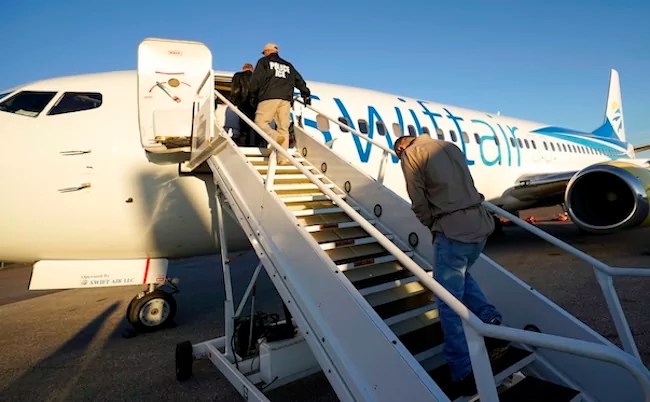Dispute That Led to Mexico Seizing American-Owned Port ‘Not Unprecedented’: Expert
A U.S. senator claims that the Hispanic war has left a port in Mexico that is owned by the Vulcan Materials Company of Birmingham, Alabama.
Sen. Katie Britt( R – Ala. ) said in a statement,” I am happy to hear that Mexican governmental forces have now heeded our request to withdraw from Vulcan’s port facility, following an almost two-week unlawful takeover.”
” There was never a good reason for Mexican law enforcement and military personnel to hold this Alabama company’s private property forcefully.”
The Senate Committee on Appropriations’ Homeland Security Subcommittee has Britt as its highest ranking person.
On March 14, at 5:30 a.m., Mexican authorities and Marine personnel reportedly took control of the property at Punta Venado in Quintana Roo, Mexico, to permit the load offloading of goods on the ship owned by the Mexican building materials company CEMEX.
Since late 2018, alleged violations of the North American Free Trade Agreement ( NAFTA ) have been the subject of arbitration between Vulcan Materials and the Mexican government.
The statement claims that on March 27, Britt and some members of Alabama’s congressional delegation met with Esteban Moctezuma, the Mexican ambassador to the United States, in the American embassy in Washington.
The group requested in a letter to Moctezuma why the army remained in the port after the Mexican Federal Court’s March 16 deadline to keep. This led to the meeting.
Despite the events, as of the date of this letter, Hispanic military and law enforcement causes remain on the house and show no signs of leaving, according to the letter’s March 22 day.
The letter continued by stating that the port’s seizure was” the latest in a design of the Hispanic government ignoring the rule of law.”
At Villanova University in Pennsylvania, Jonathan Doh teaches planning and serves as professor of research. Although this disagreement has lasted longer than usual in his understanding, he claimed that conflicts are common in international business.
Neither Extraordinary Disputes
Doh told The Epoch Times that conflicts of this nature are not unusual. ” We have these clauses in international trade agreements for precisely this reason.”
The North American Free Trade Agreement, which was first negotiated in 1994 and later renegotiated as the U. S. Mexican-Canada Agreement ( USMCA ), according to him, covers the agreement between Vulcan and the Mexican government.
These contracts aim to guarantee that all events are treated fairly and have options if there is a debate. The ultimate goal, according to Doh, is to make sure that foreign-owned companies are treated equally with private ones.
Doh claims that this is significant because in order to guarantee free trade, social, legal, and professional variations must be addressed.
For instance, the view of police and naval personnel assuming control of a company can be particularly unsettling for citizens of nations without regional police forces that prevent their military from upholding the law.
Vulcan Lists Tax Grievances
Doh emphasized that most Mexican citizens are most unfamiliar with American legal principles.
” Our special rules and regulations apply to us.” That’s precisely why we have( trade agreements ), he claimed.
According to Vulcan’s problem, a number of Hispanic government agencies have unfairly taxed the house while disobeying orders from their own courts to halt the taxation and reimburse the business. Authorities in Mexico claim that Vulcan has mined illegally.
According to Doh, Latino President Andrés Manuel López Obrador has developed a reputation as an internationalist since taking office in 2018. For instance, the Mexican authorities implemented measures in 2013 to adhere to the Paris Climate Accords. This included allowing foreign customers access to Hispanic energy markets.
American Businesses Are Concerned
According to reports, Obrador retracted those regulations in favor of PEMEX, the state-owned power company in Mexico.
” Some U.S. companies have expressed misgivings about the Mexican authorities in some instances. According to Doh, they have accused Mexico of dragging its ft( in trade agreements ).
In Mexico, Vulcan has been active for more than 30 year. To stretch heavy draft ships with marble for export to the United States, it constructed the port in Quintana Roo. Vulcan has been charged with illegally mining similar materials by Mexican authorities.
The Mexican government has” deployed the comprehensive powers of the State to tamper with Legacy Vulcan’s designed project to and develop and produce export for export to the United States ,” according to documents filed with the U.S. State Department during the arbitration process.
" Conservative News Daily does not always share or support the views and opinions expressed here; they are just those of the writer."





Now loading...